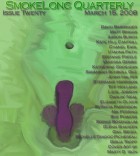There’s a lot of emotion without sentimentality here, a lot of bickering without hostility. It works beautifully to illustrate how this family copes with loss. How do you reign in your work to keep it from becoming over-done?
Thank you. That’s the constant battle isn’t it? That avoiding of falling into the sentimental and keeping true to character experience. For me it’s what I aim for in working to be patient in my staring with and listening through character, working constantly to open myself more to the character experience. I think that sentimentality and unnecessary and distracting adornment come from authorial imposition of judgments that I seek to avoid.
The ending startled me. I didn’t see it coming.
I didn’t either. I’m a writer who lets the moment take me, who often grapples through the unknown with her characters on the way to finding the story. I found myself in the desert, a landscape familiar to me, with the dirtbikes roaring outside, and with this family, and the source of their sadness revealed itself.
What a pleasure to talk with you again, and so quickly! Anything new with you since the last issue of SmokeLong?
I’m planning to teach a four-day workshop in November at this lovely place in Chatauqua, New York. Some readers might be interested in this. Here’s the link.
While reading through the annual Kathy Fish Fellowship applications, I was struck by the number of writers who were using flash as, to paraphrase, a means to an end. Most people weren’t writing flash because they loved the form, because it took them places other types of fiction didn’t. Instead, they were using it as a gateway into longer works—short stories, short story collections, novels. As a champion of flash, I found this discouraging. Is flash fiction less satisfying, in terms of either writing or reading, than longer works? Or is it that the markets still haven’t accepted flash as a legitimate form? Why do you write flash, and where do you see it taking you?
Well, first, Kathy Fish. There’s a delightful master of the form. I found myself initially flirting with the genre on the way to other things—entries into novel sections, longer stories, nonfiction. It still does this, provides me with entry, sometimes, but I’ve grown to have a deeper respect for the form, and love the way it bursts at its boundaries. I think sentences in a good piece of flash fiction are every bit as charged as sentences and lines in a prose poem. I like the blurring of boundaries, the crystallization. There are so many of the best stories that I think we forget sometimes might fall into that categorization, like Mary Robison’s “Yours,” which is something like 732 words and unforgettably beautiful and meaningful. So, sure I see it leading me into other works sometimes, but I also see it as a legitimate and wonderfully subversive and versatile form in and of itself. What started out as flirtation has grown into a pretty solid and engaging relationship with the form that I’ll be continuing. I sense that there are still so many places it can take me and so much more it can teach me about narrative possibilities.



 The core workshop of SmokeLong Fitness is all in writing, so you can take part from anywhere at anytime. We are excited about creating a supportive, consistent and structured environment for flash writers to work on their craft in a community. We are thrilled and proud to say that our workshop participants have won, placed, or been listed in every major flash competition. Community works.
The core workshop of SmokeLong Fitness is all in writing, so you can take part from anywhere at anytime. We are excited about creating a supportive, consistent and structured environment for flash writers to work on their craft in a community. We are thrilled and proud to say that our workshop participants have won, placed, or been listed in every major flash competition. Community works.